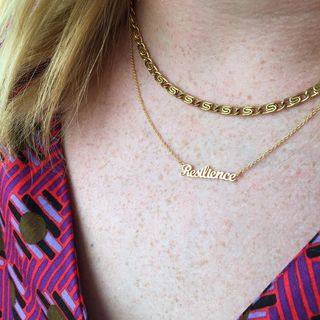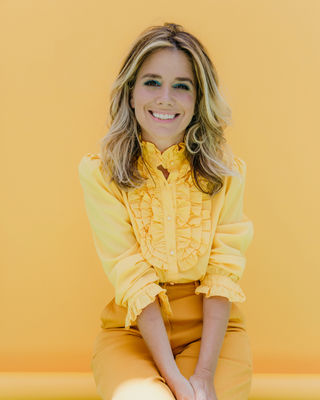Health
When We’re Okay… Sometimes
How one serious business woman works a balance.
Posted October 23, 2018
In May, I wrote a post about the Anxiety and Depression necklaces created through a collaboration between ban.do and Iconery, two fashion and lifestyle brands.
Since then, there’s been one more necklace added to the mix: Resilience.

The conversation around the creation of these necklaces has continued, too, both here on my blog as well as in the communities created and cultivated by Jen Gotch, the founder of ban.do and a mental health advocate who comes to advocacy by way of personal experience.
The contrast between anxiety, depression, and resilience, and the constant work of seeking to balance all of those experiences, is something with which Gotch is intimately familiar.
I had the chance to speak with Gotch about the personal experiences that led her to create these kinds of statement pieces, the experience of putting into the world a new representation of something that means a lot to many people, and the way she is trying to reach more people through a podcast.
What do you think is important for Psychology Today readers to know – about you, about your work, about your vision?

The biggest thing for me is the fact that you can struggle with mental health issues and not have to have it define you and limit you. You can actually look at it as a challenge to grow and evolve.
It’s been a huge motivation for me to build my emotional intelligence and self-awareness. What that’s done for me is amazing and what that’s done for the people around me is great. I feel like I can see and understand things.
I don’t take [depression] lightly even though I’m lighthearted about it. I have never looked at it as a gloom and doom thing. I found it to be a huge relief when I found out what was wrong with me and how to deal with it. Now I know what I’m dealing with. It makes me interesting. I like the idea of having a positive approach about something that is not traditionally positive.
The necklaces: What’s the best feedback you’ve received and what’s the worst?
When we first launched them, there really was not enough forethought – I was just living in my context, which was “everyone is in support of it.” When we launched it, they still sold out in an hour – the people who feel passionate about it do want them.
But, it was very triggering to some people. There will always be a segment of people who are mad at that. A lot of the anger comes from people who are not reading all of the information – they didn’t realize it was a philanthropic effort, or about my story – it was about opening conversations, not about labeling, or making it a trend.
We have an army of mental health activists wearing those necklaces.
The podcast: How do you determine content?
There is a responsibility that comes with it. I’m getting in people’s ears in a really personal way. They feel connected to me. [The podcast is called ‘Jen Gotch Is OK... Sometimes.’]
I did not get into it to make money or generate money – I got into it because I’m passionate about it. You’re doing it to help people and help them feel less alone every week. I know I’m doing that, I get that feedback very regularly.
I intended to go into the space with something very different, which is harder. I don’t want to create just another thing that someone else has already done. If I can’t be me and do it how I want, it’s not necessarily worth it to me. My name is the podcast. It can’t be formulaic.
It’s incredibly vulnerable. It’s hard to come up with stuff and do it in a meaningful way, not just be off the cuff. I thought it would be more off the cuff. I still do research so that I am prepared. It is a good challenge.
I think a lot of people must say that they feel like they know you because you are so open. How do you decide what to share and what to keep for yourself?
I think for me there’s not a lot of deciding in my life. The things just come out before I know that they’re on their way out. Honestly, the only things I don’t share are the things when someone else is involved.
For instance, when I was going through a divorce, I knew I was going through a divorce a lot earlier than when I talked about it.
It’s important to respect other people’s comfort levels. But, when it comes to me, unless it’s something really gross, I’ll say it. Really gross is not my brand.
---
The aspect of the way that Gotch lives and works that's most interesting to me is something she raised as we spoke: “How can you put a ‘no bad days’ shirt up when we’ve seen you have bad days?”
Says Gotch, “You can’t recognize a bad day or a good day without having had the other. But, it is also aspirational. I don’t want to be doing a disservice through optimism."
It's a more nuanced reality that Gotch presents. Maybe it's easier to be inspired by a 'no bad days' shirt created by someone who has seen her fair share of bad days.
Copyright 2018 Elana Premack Sandler, All Rights Reserved




